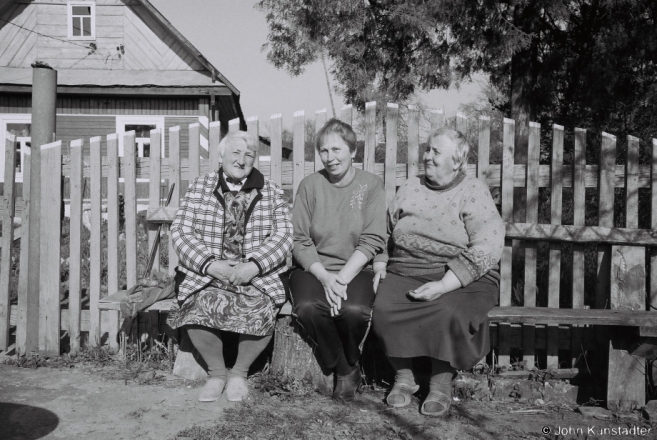The roots of the Belarusian nation: photo excursion to ethnonyms of the Valozhyn District. Карані беларускай нацыі: вандроўка па этнонімах Валожыншчыны.
Having spent more time than planned in Vjalikaja Dajnava and neighboring Uzbalats’, I decided to forego the second village in the cluster of ethnonyms, Malaja Dajnouka (Малая Дайноўка), and to head toward Zhomajdz’.
The road passed through Filipinjaty (Філіпіняты), which proved too photogenic not to stop. At the far end of the village I came upon these three ladies. Normally at this hour they would have been tending their gardens or field plots, saving conversations on the bench for the evening. However, as in Vjalikaja Dajnava, the villagers of Filipinjaty celebrate a four-day Easter feast (through Easter Wednesday — Bright Wednesday) rather than the more widely-observed three-day feast within Easter Week. This being Easter Wednesday, they were enjoying the final afternoon of the four-day feast. Seeing me taking a photo of one of the village crosses, they called out that the angle was better from their side.
I went over to them. We chatted. Judging by the way they held themselves and spoke quietly and easily but alertly, I asked if they were school teachers. They smiled. I am, said the lady in the middle. Collective farm brigade chief, said the lady on the left. Nurse, said the one on the right. They asked what I did and where I was headed. I told them I was a photographer working mostly in Polesia but that day had decided to photograph villages with intriguing names in the Valozhyn District and thus was headed to Zhomajdz’. Then you must photograph our church, it’s on the way in Slavjensk, they said. I said I had been fortunate to photograph the church the previous year but would gladly do so again. Remarking that their church’s feast day of St. Nicholas would take place the next month, they suggested I attend and spoke warmly of their previous priest, who was also from Polesia. Perhaps from Rubjel’, a font of outstanding priests, I suggested. The ladies weren’t certain, but after thinking a minute, said Rubjel’ sounded right. He’s now the priest in Khatljany in Uzda District, they said. His church burned down in early 2013 but he’s already busy rebuilding it. Sounds like a Rubjeljets, I said. Before parting, I asked permission to take their portrait, and after some classic, and always charming, Belarusian demurring they relented. It will be a pleasure to take them copies of the photo on one of my next trips to Belarus.
Collective farm brigade leader, teacher, nurse. Easter Wednesday, Filipinjaty 2014. Брыгадыр, настаўніца, медсестра. Сьветлая серада, Філіпіняты 2014 г.
